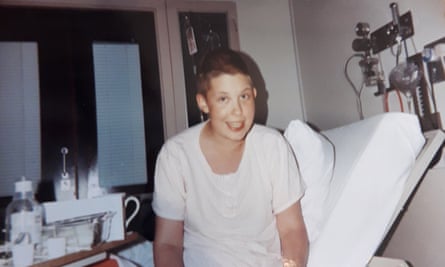
We didn’t know until the very last minute whether my sister would be let out of hospital for Christmas.
It was 1991 and we were camping in a house in London that a friend had lent my parents, waiting to find out. Home, in theory, was Rome for my parents, Edinburgh for me – but in practice, a year and a bit into my sister’s leukaemia, home was wherever Ninka was being treated. There had been a brief, sunny period in the summer where she had been in remission. When the cancer came back, Mum just put her into the car and drove her from Italy to the Royal Free Hospital in London.
Now, after other treatments had failed, the hospital was preparing her for a bone-marrow transplant. That meant blasting her with chemo and keeping her in isolation. That’s what I remember, anyway. In my memories, which are not perfectly intact, she was in a kind of tank, like in a science-fiction film. We could still go in to visit her, wearing aprons and gloves, but she was not supposed to leave the tank. We didn’t know it then, but the transplant would only work for a few months before the cancer would come back again, more aggressive than ever, and would take her away from us for good. But we didn’t need to be told this could be her last Christmas. Everyone who has been through this knows the way in which, from the moment you hear the news, you are constantly braced.
We were not the most functional of families most of the time, but before and after her diagnosis at the age of 16, my sister was the thoughtful, kind person who held the rest of us together (although she could also be a proper pain in the arse). I had combined the worst of my parents – bad-tempered, impatient, my mum’s pear shape – while Ninka had inherited Mum’s sweetness and my father’s occasional, wonderful silliness. She had inherited my dad’s height and long legs, too, overtaking me a couple of years earlier. My father openly said she was his favourite, and that seemed fair enough because I preferred her to everyone else too.
I don’t remember much about the wait to find out whether she’d be let out but I remember the bolt of joy when the doctors, at the absolute last minute, confirmed we could take her home. On Christmas Eve we bundled her up in blankets and wheeled her off the ward. She was all long, skinny arms and legs, tiny duckling tufts of hair left clinging to her skull, pale with nausea – the chemo made her wretchedly sick – but still full of stupid Ninka jokes, still failing to take me anything like as seriously as I was pretty sure I deserved, given that, at 19, I was a year and a half older than her.
She and I had an unbreakable ritual on Christmas mornings, after sharing a bedroom for the first 12 years of our childhood, and this year was no different. We would leave our Christmas stockings at the ends of our beds to be filled, and then get into bed together in the morning and go through them, taking it in turns and opening one gift at a time. Mum (or Santa Claus) wrapped each little thing up in red and green tissue paper – a tiny finger puppet, a packet of Smarties, a pouch of nice felt-tips … always, always a tangerine. Anything big and serious went under the tree for later, but this was just the two of us, snuggled up, toasty warm under our duvet, messing around with bits of tissue and chocolate coins.
And that was my best present ever. I wish I could remember every detail of that Christmas but the memories are vague. We had immutable traditions for every part of the day: buck’s fizz for breakfast, my father pretending not to want to open the presents, and then, finally, the presents and a beautifully decorated table for lunch. We were not in our own home, but Papa was a genius at making a room gezillig – Dutch and candle-lit and cosy. There would probably have been one of our obscure family games or Trivial Pursuit in the afternoon. Christmas was one of the times when we all tried hard to make it work, and that particular year we found our best selves for her.
We only talked once about death – not then, but a few months later. God, Ninka was so magnificent. Thirty years later, I’m awed all over again at her courage: she never complained, never sulked. But when we knew the bone marrow transplant had failed, and her body began to fall apart like a clown car, she tried to joke about it and told me I had to marry someone she liked, someone who ate McDonald’s and wine gums or she’d come back and haunt me. She only let herself have one moment of self-pity, telling me: “I’m too young to die.” That was it.
But clear and golden and absolutely real in my mind is Christmas morning and my sister, tucked up in bed, with the tufts of hair on her head, her long fragile fingers, our great, great love for each other, the warmth of the duvet, the smell of tangerine, the rustle of the paper. The amazing thing is that that memory never ever dims.



